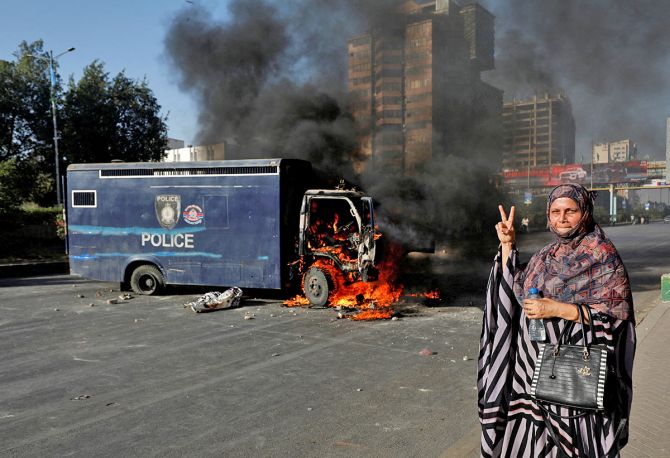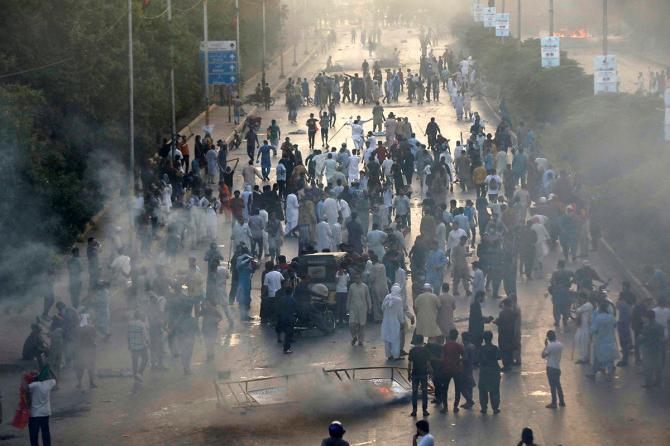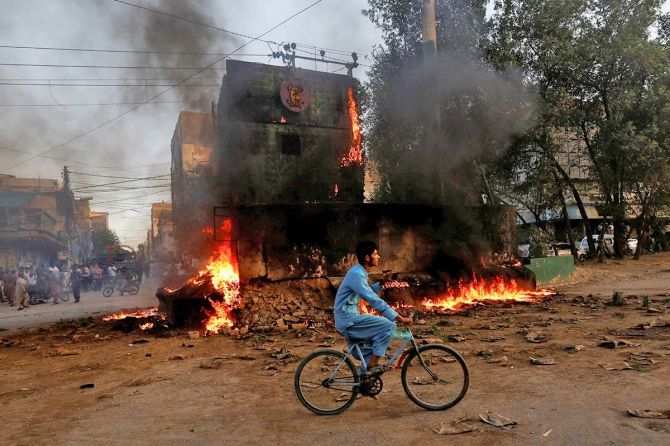His disqualification to participate in future elections may follow, notes Rana Banerji, who headed the Pakistan desk at RA&W, India's external intelligence agency.

Former Pakistan prime minister Imran Khan was arrested from the premises of the Islamabad high court on May 9 afternoon on a warrant of arrest issued by the National Accountability Bureau, for irregular acquisition of property, which has been deemed to fall under corrupt practices by a holder of public office, under Section 9 (a) of the NAB Ordinance, 1999.
Pakistan estate dealer Malik Riaz had sold a property in Britain (ironically, after purchase from Nawaz Sharif's son). The National Crimes Office had frozen these funds. Later, after an out of court settlement, 190 million pounds were released for refund to the government of Pakistan.
Part of this money was adjusted in the supreme court of Pakistan's account against Malik Riaz's dues. The balance was apparently set off, in violation of money laundering laws, for land grants to Imran's family and friends. These transactions happened in 2019, when Imran was PM.
458 kanals of land in Mouza Bakrala, Tehsil Sohawa, Jhelum district and 240 kanals in Bani Gala, Islamabad (in the name of absconding business lady associate Farah Gogi) were gifted to Imran, ostensibly for setting up a university in the name of this trust.
The properties are registered in the name of the Al Qadir Trust, of which both Imran and his wife, Bushra Bibi are the only trustees.
A small university campus was apparently set up in Sohawa, but very few students have enrolled and the university has not been recognised yet by Pakistan's education authorities.
Soon after Imran's arrest, Pakistan Tehrik e Insaf cadres resorted to slogan shouting, arson and violence. Protest demonstrations were held in Lahore, Islamabad, Karachi, Quetta and other cities.
Unruly protestors breached the perimeters of a guest house in the Lahore corps commander's residential compound. PTI supporters, including women, gathered outside and shook the gates of the Pakistan army's general headquarters cantonment boundary fencing in Rawalpindi.
Unconfirmed reports suggested even a break in inside. These uprisings, though small so far, have been rather unprecedented, especially as the direction of protestors' ire seems focused against Pakistan's army.
Taking umbrage at Imran's arrest on the court premises, Chief Justice Amir Farooq of the Islamabad high court summoned the IGP Islamabad and the federal interior secretary to appear before him. He questioned whether the Pakistan Rangers, deployed to arrest Imran, were used in aid of the civil authority.
Islamabad Inspector General of Police Dr Akbar Nazir Khan affirmed they were. NAB Deputy Prosecutor General Sardar Muzaffar Abbasi explained the circumstances of the issue of the warrant of arrest.
Soon after retired General Nazir Ahmed Butt's appointment as NAB chairmaN in March 2023, inquiries on this foreign money trail into Pakistan were taken up in earnest. NAB had summoned Imran and Bushra Bibi in this case. After they avoided appearing, a warrant was issued.
On appeal, the Islamabad high court ruled the NAB warrant illegal on minor procedural grounds a few days ago. This arrest has ensued on a fresh NAB warrant on May 1, for which bail had not been obtained by Imran's legal team.
The CJI initially reserved his verdict, but later at night issued a short order holding the arrest legal.
The noose had been slowly, but surely tightening.
Imran kept taking advantage of an openly partial and benevolent judiciary, turning a blind eye to his repeated avoidance of indictment proceedings, as also easily getting anticipatory bail in several cases.

However, Imran seemed to have crossed a red line during his Lahore public meeting a few days ago, accusing the director general, counter intelligence (DG-C) in the Inter Services Intelligence directorate Major General Faisal Naseer of plotting to kill him. This statement elicited an angry response from the DG, Inter Services Public Relations Major General Ahmed Sharif Chaudhry.
The ISPR press release No. PR-55/2023-ISPR of May 8 accused Imran of leveling 'highly irresponsible and baseless allegations against a serving senior military officer without any evidence.'
It emphasised, 'This has been a consistent pattern (of Imran and other PTI leaders) for last one year wherein military and intelligence agencies officials' were targeted 'for the furtherance of political objectives.'
Imran Khan is likely to be produced on remand before a NAB court in Islamabad on May 10, when indictment in the Toshakhana case is also to be taken up in the additional sessions judge's court, Islamabad.
Prohibitory orders have been imposed in the whole of Punjab and in several other cities in other provinces. The violence which erupted spontaneously due to Imran's popularity may peter out over the next few days.
If they do not, a more serious crackdown on PTI supporters under close to martial law conditions cannot be ruled out.
Even as the protests are tackled by law and order authorities, Imran is likely to face long incarceration. His disqualification to participate in future elections may follow, even as the judiciary gets the message and decides, as in the past, to throw in its cudgels of quasi- independence and conform to the doctrine of necessity.
In this backdrop, though much bravado has attached to Supreme Court Chief Justice Umar Ata Bandial's assertion that his order of elections in Punjab on May 14 still stands, elections to the national or provincial assemblies remain a far cry.
If all goes smoothly in law and order terms, they could still be held in October 2023, but the current surcharged atmosphere suggests to the contrary. Bandial remains to be tamed even as his retirement looms in four months, on September 16.

In Imran's absence, it may be difficult for second stream PTI leaders to carry forward the populist momentum. Pervez Elahi, appointed President of the party recently, over the heads of other senior leaders like Pervez Khattak, Shah Mehmood Quereshi, has never been known to confront the military establishment.
A battle for succession to Imran's mantle may ensue. Meanwhile, a six-member PTI leadership committee has been formed, under Quereshi, to decide the future course of action.
The above scenario could unravel only if dissensions within the army, which have been exaggerated by observers sympathetic to Imran in Pakistan, intensify.
The ISPR notification of May 8 constituted a clear warning, backed by the collegiate leadership of senior generals who have rallied behind army chief, General Asim Munir.
Unconfirmed media reports suggest former DG, ISI, Lieutenant General Faiz Hameed (retd) is under informal house arrest. Former army chief General Qamar Javed Bajwa has been told to cut down his interactions with the media. Other retired generals like Zahir ul Islam, Shuja Pasha and Naeem Lodhi, who rallied to Imran's side in the recent past, may be under similar close watch.
History also suggests revolts from within or coup attempts against the army chief have never succeeded in Pakistan. Only time will tell if promotion of a protégé like Imran will return to bite the omnipotent 'saviour' institution this time.











 © 2025
© 2025